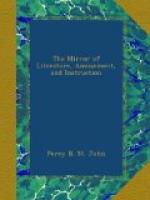Some say that even ’gainst that
hallow’d season,
At which our Saviour’s birth is
celebrated,
The Bird of Dawning croweth all night
long.
The nights are wholesome, and no mildew
falls;
No planet strikes, nor spirits walk abroad:
No fairy takes, nor witch hath power to
charm,
So gracious and so hallowed is the time.
The ancient Christians divided the night into four watches, called the evening, midnight, and two morning cock-crowings. Their connexion with the belief in walking spirits will be remembered—
The cock crows, and the morn prows
on,
When ’tis decreed I must be gone.”—Butler.
—The
tale
Of horrid apparition, tall and ghastly,
That walks at dead of night, or takes
his stand
O’er some new-open’d grave;
and, strange to tell,
Evanishes at crowing of the cock—Blair.
Who can ever forget the night-watches proclaimed by the cock in that scene in Comus, where the two brothers, in search of their sister, are benighted in a forest?—
—Might we but hear
The folded flocks, penned in their wattled cotes,
Or sound of pastoral reed with oaten stops,
Or whistle from the lodge, or village cock
Count the night-watches to his feathery dames,
’Twould be some solace yet, some little cheering,
In this close dungeon of innumerous boughs.
Dr. Forster observes—“There is this remarkable circumstance about the crowing of cocks—they seem to keep night-watches, or to have general crowing-matches, at certain periods—as, soon after twelve, at two, and again at day-break. These are the Alectrephones mentioned by St. John. To us, these cock-crowings do not appear quite so regular in their times of occurrence, though they actually observe certain periods, when not interrupted by the changes of the weather, which generally produce a great deal of crowing. Indeed, the song of all birds is much influenced by the state of the air.” Dr. F. also mentions, “that cocks began to crow during the darkness of the eclipse of the sun, Sept. 4, 1820; and it seems that crepusculum (or twilight) is the sort of light in which they crow most.”
Goes of Liquor.
Why did tavern-keepers originally call portions of liquor “goes?”
Because of the following incident, which, though unimportant in itself, convinces us how much custom is influenced by the most trifling occurrences:—The tavern called the Queen’s Head, in Duke’s-court, Bow-street, was once kept by a facetious individual of the name of Jupp. Two celebrated characters, Annesley Spay and Bob Todrington, a sporting man, meeting one evening at the above place, went to the bar, and each asked for half a quartern of spirits, with a little cold water. In the course of time, they drank four-and-twenty, when Spay said to the other, “Now we’ll go.”—“O no,” replied he, “we’ll have another, and then go.”—This did not satisfy the gay fellows, and they continued drinking on till three in the morning, when both agreed to GO; so that under the idea of going, they made a long stay. Such was the origin of drinking, or calling for, goes.




